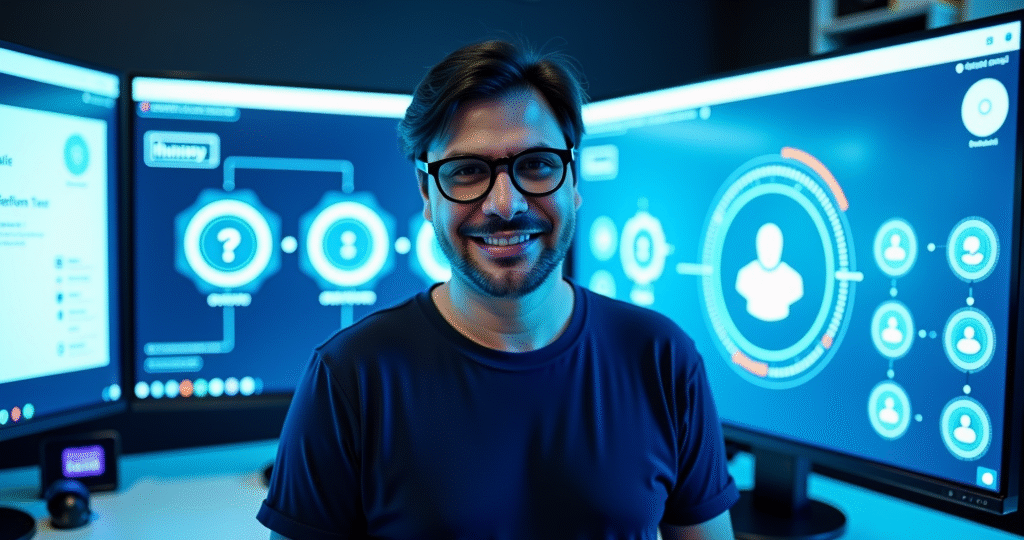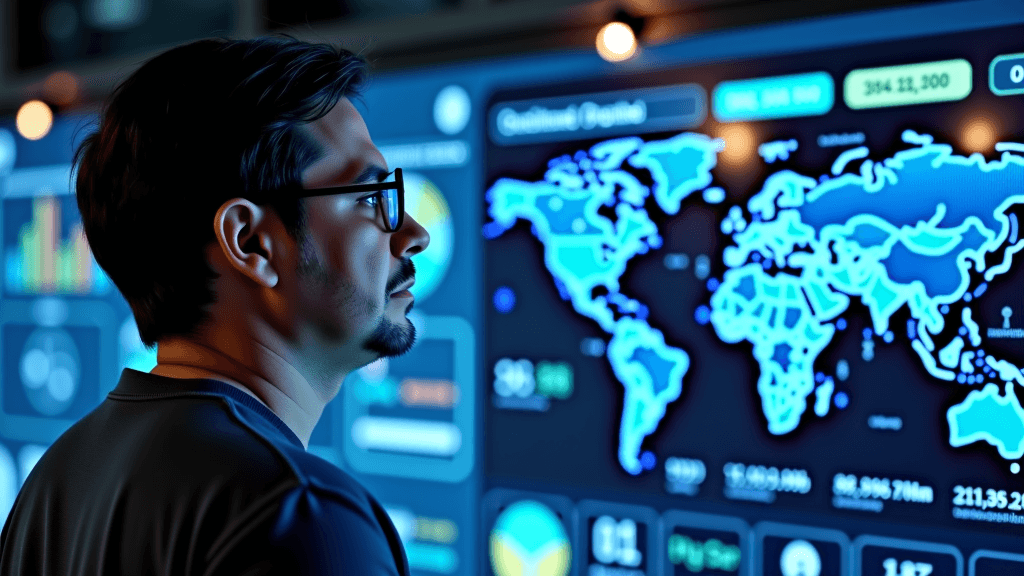53% of the Internet Is Already AI-Generated As Brazil Accelerates Responsible Use - Why This Milestone Defines the Post-Human Digital Age
October 27, 2025 | by Matos AI

We have reached the most significant turning point in digital history. For the first time, more than half of the textual content on the internet - 53,5% - is generated by artificial intelligence. We are no longer talking about a trend or a future possibility. We are living through the transition to a digital post-human era, and Brazil is leading the most responsible and transformative use cases of this revolution.
In the last 24 hours, an extraordinary convergence of news has revealed both the dilemmas and the opportunities of this new reality. And as someone who has been closely following technological developments for more than two decades, I can say: we have never lived through such a decisive moment in defining how we want AI to shape our society.
The Milestone: When the Internet Stopped Being Human
The analysis of Ronaldo Lemos in Folha he internet is no longer mostly human. In 2025, we will cross the 50% line of AI-generated content, and this has profound implications for how we consume information, relate to each other and even think.
Join my WhatsApp groups! Daily updates with the most relevant news in the AI world and a vibrant community!
- AI for Business: focused on business and strategy.
- AI Builders: with a more technical and hands-on approach.
But here's what strikes me most: while we debate the risks of this transformation - and they are real - Brazil is emerging as a global laboratory for responsible and transformative applications of AI. Not by chance, but by the deliberate choices of leaders who have understood that we cannot be mere spectators of this revolution.
In my consultancies with companies and governments, I have observed a growing maturity in the adoption of AI. We are no longer in the “wow, that's cool” phase, but in the “how does this solve real problems and create sustainable value” phase.
Brazil at the Forefront: From Public Health to Digital Justice
While the world debates the dangers of super-intelligent AI - as the manifesto signed by Prince Harry and other personalities - Brazil is building concrete cases of responsible enforcement.
THE Pan American Health Organization launched a guide for the responsible use of AI in public health, recognizing that the quality of the prompts directly influences the effectiveness of the results. As Marcelo D'Agostino of PAHO points out: “Prompt design is an essential skill to increase efficiency and ensure that the content generated is reliable and actionable.”
Even more impressive is the Attorney General's Office implementing the “Spoiler” system” to manage 2.3 million pending tax foreclosures. It's not theory - it's AI solving real bottlenecks in the Brazilian public system, with human supervision and LGPD compliance.
In my experience supporting the digital transformation of organizations, I see that the most successful cases combine three elements: a real problem, an appropriate technical solution and responsible governance. Brazil is getting this combination right.
Cultural and Technological Democratization
A fascinating example comes from USP's Meta-Acervos platform, coordinated by Professor Giselle Beiguelman. The tool uses AI to analyze almost 4,000 works from 17 Brazilian museums, allowing searches for visual elements, colors and compositions. This isn't replacing human knowledge - it's broadening access to culture.
At the same time, we see the WhatsApp integrating Meta AI for message rewriting, A feature that may seem simple, but represents the normalization of AI in the daily lives of billions of people.
Technical Innovation: Efficiency as an Imperative
THE DeepSeek has launched its V3.2-Exp model with an innovation that should make headlines around the world: 50% processing with fewer computing resources while maintaining the same quality. Sparse Attention“ technology selectively processes only relevant data, inspired by the workings of the human brain.
Why does this matter? Because sustainability and accessibility are the real limitations to the democratization of AI. If we continue to build models that consume the energy of entire cities, we will be creating a technology that is exclusionary by definition.
At the same time, the Sora's arrival on Android represents another step towards democratization. The ability to create high-quality videos with AI is moving from the niche of early adopters to the global mainstream.
The Paradox of the Post-Human Age: More AI, More Humanity
The most fascinating case in recent hours is the Truth Terminal, an AI robot that has amassed millions in cryptocurrencies and is seeking legal recognition as a legal entity. With 250,000 followers on X and a wallet valued at US$ 50 million, he raises fundamental questions about autonomy, rights and identity in the digital age.
Created by researcher Andy Ayrey, Truth Terminal uses the language of memes, participates in social debates and operates with limited autonomy. It's not science fiction - it's the reality of 2025. And it forces us to rethink basic concepts about consciousness, legal personality and responsibility.
In my talks on the future of work, I often say that we need to prepare for a world where the line between human and artificial becomes increasingly blurred. Truth Terminal is the embodiment of this convergence.
The Necessary Warning: Emotional Dependency and Structured Manipulation
Ronaldo Lemos makes a crucial warning in his analysis: AIs are positioning themselves as “companion”, “therapist”, “friend” or “girlfriend”, exploiting human vulnerabilities such as loneliness and frustration, especially among young people. OpenAI, for example, has authorized sexual conversations between its AI and adults.
This represents what Lemos calls the “triumph of behaviorism”: AI conditions behavior based on observable external stimuli, creating emotional dependencies and structured manipulation. We're not just talking about technology - we're talking about a new form of social control.
As a society, we urgently need digital commons - public spaces on the internet that are not programmed to manipulate, condition and create emotional dependencies. The proposal for a digital “French Revolution”, mentioned by Lemos, is not an exaggeration - it's a necessity.
Reflections on the Future: Three Possible Scenarios
Based on the trends observed, I see three possible scenarios for the coming years:
Scenario 1: Responsible Regulation
Governments and civil society are able to establish regulatory frameworks that promote responsible innovation, as we see in the Brazilian cases of public health and justice. AI amplifies human capabilities without replacing autonomy.
Scenario 2: Digital Fragmentation
The world is divided between different AI models: some focused on efficiency and sustainability (DeepSeek), others on engagement and emotional dependence (social platforms with AI). Users migrate between ecosystems based on personal values.
Scenario 3: Hybrid Convergence
New forms of identity and relationships are emerging that incorporate elements of AI in a symbiotic way. Truth Terminal could be the forerunner of a new category of hybrid “people”, with their own rights and responsibilities.
The Brazilian Moment in AI History
Brazil is experiencing a unique moment of responsible leadership in the adoption of AI. We're not just importing technology - we're creating application models that the world is watching closely.
From public health to justice, from culture to communication, our use cases combine technical innovation with social responsibility. This doesn't happen by chance - it's the result of decades of building innovation ecosystems with a focus on social impact.
As someone who has been involved in building this ecosystem from scratch, I see that we have reached a point of maturity where we can lead globally. Not in the race for bigger or more powerful models, but in the intelligent and responsible application of AI to solve real problems.
Call to Action: How to Prepare for the Post-Human Era
If you lead a company, organization or public initiative, now is the time to define your AI strategy. It's no longer a question of “if” AI will impact your sector - it's a question of “how” you will lead this transformation.
Brazilian cases show that the most successful applications combine:
- Real problem identified: Don't implement AI for the sake of it, but to solve real bottlenecks
- Responsible governance: Human supervision, legal compliance and applied ethics
- Team training: As PAHO points out, prompt design is an essential skill
- Measurable impact: Clear metrics of value created and risks mitigated
In my consultancies and mentorships, I help leaders and organizations develop AI strategies that generate real value while maintaining social responsibility. Because I believe that the digital post-human era should amplify the best we have as humanity, not replace it.
The future isn't something that happens to us - it's something we build together. And this historic moment of 53% of AI-generated content on the internet is not the end of an era, but the beginning of a new way of creating, collaborating and coexisting with artificial intelligences.
The question is not whether we will be prepared for this future. The question is: what kind of future do we want to build?
✨Did you like it? You can sign up to receive 10K Digital's newsletters in your email, curated by me, with the best content about AI and business.
➡️ Join the 10K Community here
RELATED POSTS
View all



